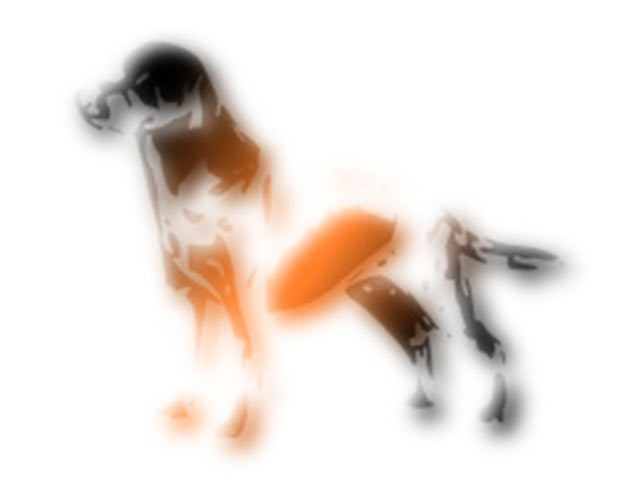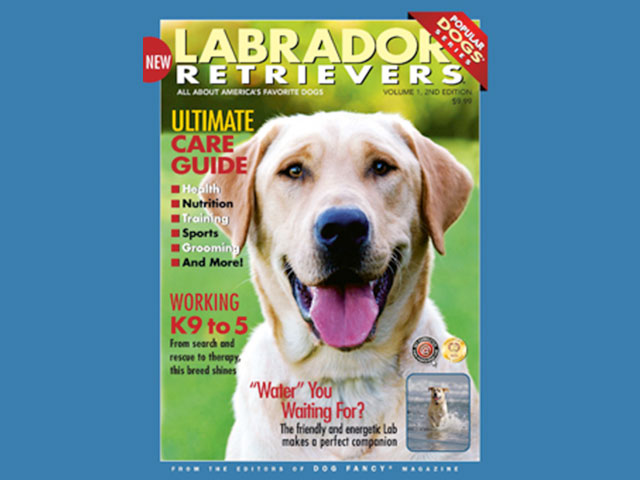Labrador Retrievers: Caring for a Rugged Dog


A Happier and Healthier Puppy
Think of grooming as a way to train your puppy to enjoy being touched. Robin Anderson has been breeding and grooming Labs since 1984. As she explains, "The first day your puppy is home, touch her mouth, ears, feet, belly. Teach her that being handled is natural. When she's an adult, it'll be no big deal at the vet's office."
Take it from Barbara Burri, a veterinary technician and president of the Labrador Retriever Club of Greater Boston. Every day, she sees how wonderful it is when owners begin grooming early. "It's a great way to 'vet proof' your puppy. Vets love all dogs, but when a difficult one walks through the door, you see eyes rolling – 'oh, no, it's fluffy.' When one is easygoing, it's like, 'Hey, there's Rex, he's such a wonderful dog.'"
Developing grooming techniques assures that your puppy matures into a dog you are proud of. She will be calmer about examinations, reducing her stress, and your stress as well.
Regularly touching and examining your puppy also gives advanced warning of health concerns. Ann Burns has groomed many dogs since 1968, Labs in particular since 1986. As she puts it, "I was born with a brush in my hand. Labs tend to get into things. If your puppy has a thorn in his foot, grooming him and touching him is a great way to discover it."
A thorn in the foot may be minor. But grooming also reveals more serious concerns. "When you become hands-on with your dog," Ms. Burri explains, "you see everything early. Maybe you notice an eye issue, or a little ear problem before it becomes a major infection."
With general health and happiness benefits in mind, take a look at specific grooming techniques.
Shedding
Lab puppies have a soft coat that does not need much brushing. Over the first year, a hard, outer coat comes in. When your puppy is grown, you will need to brush out the soft undercoat about twice a year. You will know when it is necessary. "It's called 'blowing their coat,'" Ms. Anderson says. There will be hair all over your floor. You'll see tufts of fur along her flanks and under her chest."
Controlling shedding is simple. Just brush out the soft undercoat before it has a chance to fly all over your house. To do this, your Lab needs to sit still while as you brush him.
Labrador Retriever experts suggest using a soft rubber brush. "It feels nice, like a massage for your dog," Ms. Anderson says. Do not wait until the first time your Lab blows his coat. Start as a puppy getting him patient about brushing. "That way, you'll be able to do it at home later on," Ms. Anderson adds. "Otherwise, you might have to go to a professional groomer."
Here is an opportunity for basic obedience. "When you brush your puppy, she will try to wiggle away or nip playfully at your fingers," Ms. Burns says. "Firmly insist that she sit still until you brush her all over."
Limit Bathing
Labrador Retriever coats have oils that repel dirt. For the most part, bathing is not necessary. "If your dog is really smelly," Ms. Burns says, "give him a bath. But a good brushing is better." Excess bathing removes those protective oils and actually promotes dirt.
Dealing with Wet Fur
Ask owners about their Lab's favorite activities, and swimming tops the list. You want to give your puppy opportunities to swim, for exercise and happiness. But do not overlook grooming requirements that come along with the fun.
After a good swim, people often take their Labs directly from the river into the back of the car, sopping wet. This can create health issues. After your puppy has had a great time playing in the water and mud, dry her off thoroughly before she gets into the car.
Perhaps this sounds unnecessarily fussy. But it can be serious. "While playing, she can scratch her skin," Ms. Anderson explains. "Then she lays down in your car with wet fur, and it can develop into hot spots, which lead to infections. That's an expensive vet treatment." Many times, when Lab owners see hot spots, they do not realize that this is the hidden cause.
Rambunctious puppies often will not sit still for toweling. This is another opportunity for basic training. "I make it into a game," Ms. Burri says. "I yell, 'Wet dog!' My puppies come thundering over. I give them a little treat. Pretty soon, they love getting toweled off."
Keep a few towels in the back of your car. And make sure to remove the collar before toweling off. A wet collar on wet fur is another potential source of infection.
Nail Clipping
With brushing and toweling perfected, now comes nail clipping, a bigger challenge dreaded by dogs and owners alike. Like all grooming, starting young makes a difference.
To prepare, get your puppy used to having her paws touched. Each day, gently lift each paw up for five seconds. Maintain a playful attitude. "If you touch your puppy's paws right from the start," Ms. Anderson says, "it's easier once you begin clipping her nails, and when you go to the vet she won't think it's bizarre when someone examines her paws."
Speaking again from veterinary perspective, Ms. Burri says, "We tell our clients, get their puppies used to having the toes touched. When you come to the clinic, you won't have the 'Labrador cowboy circus,' – three technicians holding your dog down for nail clipping!"
Owners who get their puppies accustomed to having their paws touched guarantee stress-free vet visits. "Then it's a quick in-and-out," Ms. Burri says, "not traumatic for the puppy, the owner, or the vet staff!"
In the first year, Labs have fine, thin nails. Cut just the sharp tips using either scissor or guillotine clippers. Think of puppy nails as practice. "If you get good at the little nails," Ms. Burri explains, "you and your dog will be ready when thicker ones come in."
The Ears
After conquering nail clipping, checking your puppy's ears is a breeze. During regular grooming, for about 10 seconds each, have your puppy sit still as you lift up his ears and look inside.
Labrador retrievers are prone to ear infections. They love water, and those floppy ears cover the damp inner parts – a perfect environment for bacteria. When toweling off after a swim, pay special attention to the ears. "Use cotton balls swabbed with rubbing alcohol to remove water and dry the ears out," Ms. Burns suggests.
Start early, and you will be thankful. "If your Lab develops an ear problem, it will be easy for you or the vet to do treatments, because he'll be used to it," Ms. Anderson promises.
Oral Care
Oral care is the most overlooked grooming need, yet it is perhaps the most important for long-term health. Research shows that tooth and gum health is directly related to healthier kidneys, liver, and heart.
Still, for most owners brushing their puppy's teeth runs a close second behind nail clipping as the most dreaded grooming task. Again, get started while your Lab is young.
To lead up to brushing, use a simple ritual in the first couple of weeks. Open your puppy's mouth and look inside. Gently insist that your puppy allows you to do this for eight seconds. While her mouth is open, touch her teeth with your fingers. "Offer constant praise," Ms. Anderson suggests, "and when you're done give her a treat. She'll learn that opening her mouth is good. That will make it easier when you go to the vet and they need to examine her gums."
There are several effective toothbrushes. If your dog tolerates it, try an electric brush. But a standard handle type is good, or use one of the rubber ones that fit over your finger. "Whichever one you use, it's vital to get her used to brushing," Ms. Burri emphasizes, again sharing her perspective as a veterinary professional. "Besides a huge health advantage, brushing twice a week can save you hundreds of dollars on dental cleanings."
Summing Up
Remember, dogs are excellent at reading body language. If you feel stressed, your puppy will be stressed. If you feel relaxed, your puppy will be relaxed. "Make grooming pleasurable," Ms. Anderson says. "At each stage, offer her praise and treats. The way to a Lab puppy's heart is definitely through her tummy!"
"Grooming helps you build a relationship," Ms. Burri promises. "You'll learn how to assert your authority, confidently and consistently. You realize it's OK to ask your puppy to stand quietly and do what you ask. Soon, both of you enjoy it!"
